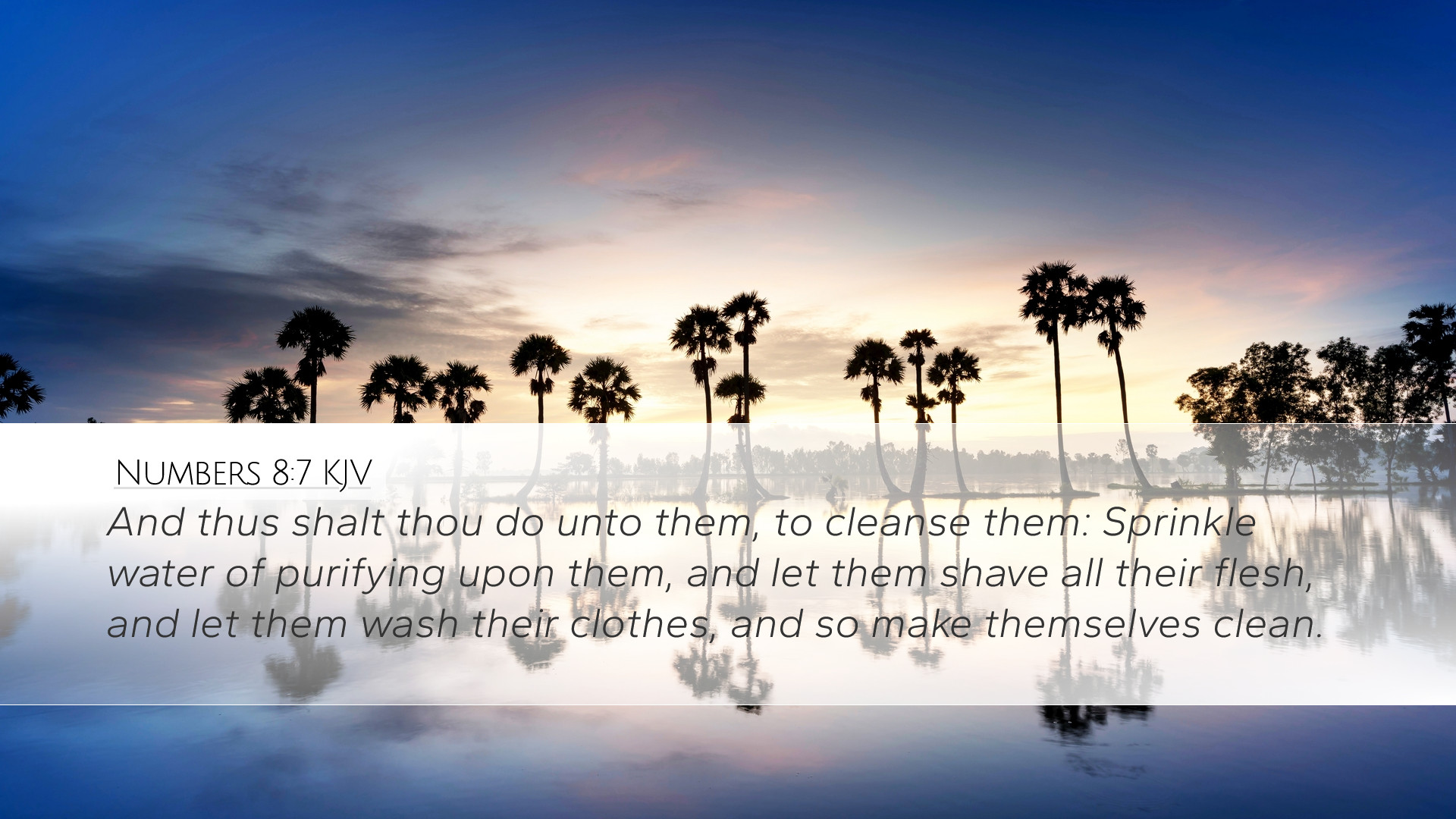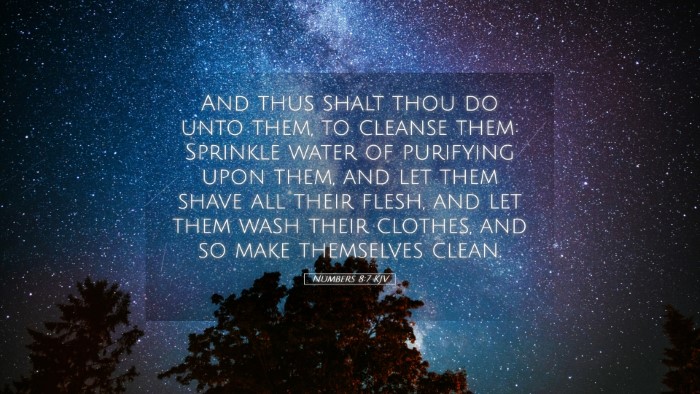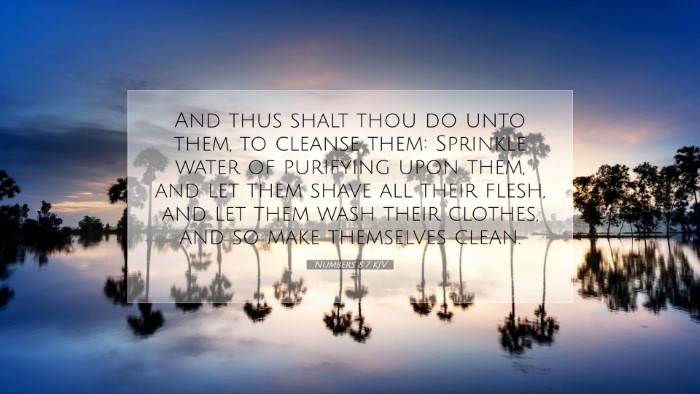Commentary on Numbers 8:7
Numbers 8:7 states: "And thus shalt thou do unto them, to cleanse them: sprinkle water of purifying upon them, and let them shave all their flesh, and let them wash their clothes, and so make themselves clean."
Introduction
The verse at hand is part of the larger narrative concerning the consecration of the Levites. In the broader context of Numbers 8, the Lord instructs Moses on the method of purifying the Levites who are to serve in the Tabernacle. While the Old Testament rites may seem archaic, their theological implications and foreshadowing of New Testament truths offer rich insights for today’s pastors, theologians, and students of Scripture.
Thematic Insights
- The Nature of Ritual Cleansing: The prescribed sprinkling of purifying water signifies the importance of ritual purity in approaching God. This echoes other ceremonial washings in Scripture, highlighting that God desires holiness among His servants.
- Symbolism of Shaving: The act of shaving all their flesh denotes a complete removal of anything that may be deemed impure. This symbolizes the total commitment required in serving God and aligns with New Testament teachings on the necessity for believers to shed the old self.
- Clothing as Symbol of Righteousness: Washing their clothes symbolizes the importance of being clothed in righteousness and purity before God. The cleanliness of garments can be seen as a metaphor for the state of the heart.
Commentary from Matthew Henry
Matthew Henry notes that the cleansing process outlined in this verse mirrors the sanctification process for all believers. He emphasizes the necessity for spiritual purification in service to God, indicating that these ceremonial practices foreshadow the spiritual cleansing that Christ would ultimately provide through His sacrifice. Henry emphasizes that purification is not merely external but necessitates an internal transformation.
Commentary from Albert Barnes
Albert Barnes elaborates on the significance of the ceremonial law for the Levites and the lessons it conveys for modern-day believers. He points out that the water of purification represents the Word of God, which cleanses the believer (Ephesians 5:26). Barnes identifies the shaving as a profound metaphor signifying the need for a radical change and dedication in the believer's life, indicating that followers of Christ should be willing to forsake their sins and worldly desires completely.
Commentary from Adam Clarke
Adam Clarke provides detailed insights into the cultural and historical context surrounding this verse. He discusses the ritual significance of water in Hebrew culture and how it served as a medium for spiritual cleansing. Clarke also elaborates on the meaning of 'washing their clothes' as a sign of readiness to serve in holiness, interpreting it as a call to wear the garments of salvation. He encourages contemporary readers to approach their service with a full understanding of the sacrificial nature of their commitment to God.
Theological Implications
This verse illustrates vital doctrines relevant to both the Old and New Testament believers. The principles of sanctification and purification remain abundantly applicable today:
- Sanctification: The call to be cleansed reflects the believer's journey towards holiness. This process remains essential as believers are encouraged to continually seek spiritual purity through confession and repentance.
- Symbolism of Water: Just as water was used for physical cleansing, it also symbolizes life and renewal in Scripture. Believers are reminded of their baptism, representing both cleansing from sin and new life in Christ.
- Devotion to Service: The subsequent actions described—shaving and washing—illustrate the seriousness with which one must regard their service to God. As full-time servants, believers are called to present themselves as living sacrifices, holy and acceptable to God (Romans 12:1).
Application for Today’s Believers
This commentary encourages pastors, students, and theologians to reflect on their personal sanctification processes. The following applications may be considered:
- Personal Reflection: Evaluate your own path to purification. What habits, thoughts, or actions may need purging to enhance your service to God?
- Collective Purity: Church leaders should strive to promote collective holiness within their congregations as part of their teaching and community activities.
- Encouragement of Holiness: As believers, there should be a persistent reminder of the calling to holiness in various avenues of life and ministry, echoing the call given to the Levites.
Conclusion
Numbers 8:7 serves as a crucial reminder of the holiness required in the life of every believer, particularly those called to serve in ministry. Drawing upon insights from respected biblical commentators, one can grasp the importance of ritualistic cleansings while recognizing their spiritual counterparts in the believer's journey toward sanctification. As we continue to explore Scripture, let us hold onto the profound truths encapsulated within these ancient rituals, allowing them to inform and transform our lives as we strive for purity in our service to God.


